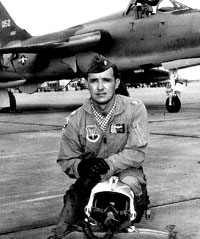Former POW, James Hiteshew, dies at age 75
By Dennis Hill
Published in News on February 8, 2006 1:50 PM
From staff reports
Retired Air Force Col. James Hiteshew, who spent six years in a North Vietnamese prison after being shot down on a combat mission, died Tuesday after a brief illness. He was 75.
Hiteshew's fighter jet was shot down over Vinh Phu Province in March 1967. He was quickly captured and spent months in a body cast after suffering two broken legs and a broken arm. He was subjected to torture and intense interrogation for months.
Hiteshew stayed in the Air Force after the war ended, retiring in 1979. A Pikeville resident, he remained an avid flyer until his death.

Col. James Hiteshew is seen with his F-105 Thunderchief fighter jet in the+ 1960s. Hiteshew flew 75 combat missions in the jet during the Vietnam War.
Those who served with him said Hiteshew had a love of country -- and an intense dislike for anyone who disrespected it. That, combined with courage and a sense of duty, made him a hero.
"Use the word 'warrior' in there somewhere. That's what he was," said retired Lt. Col. Mike Cooper, who was one of Hiteshew's flight instructors at Seymour Johnson Air Force Base in the mid-1960s.
Hiteshew was awarded the Silver Star, the Distinguished Flying Cross, the Bronze Star of Valor, the Legion of Merit, the Purple Heart and more than seven Air Medals.
After leaving the Air Force, Hiteshew went back to school, earning a master's degree in science and worked as a professor of aerospace studies at the University of Tennessee for four years.
Family and friends described him as a tinkerer by nature, who loved to work on old cars or with wood.
"He was a role model, as a father, a citizen and an Air Force officer," said retired Gen. Norman Gaddis, who also spent several years in the "Hanoi Hilton." He described Hiteshew as "a warm person, with a good sense of humor but very realistic."
Hiteshew, a major at the time, was on his 75th combat mission on March 11, 1967, when his F-105 Thunderchief was shot down. Two other pilots also were shot down during the mission. Capt. Charles Greene Jr. and Capt. Joseph Karins Jr. also were captured.
Hiteshew described being captured as a surreal experience, almost as if he were watching someone else going through the ordeal. He said he was beaten repeatedly and tied to a pole where Vietnamese villagers pelted him with rocks for hours. He was kept in a 12-foot-square cell, where he learned to stay in touch with other prisoners through a system of codes tapped on cell walls. He said he exercised in his cell and practiced mental exercises such as memorizing the books of the Bible or the presidents to keep his mind sharp.
Greene survived captivity to be released along with Hiteshew and hundreds of other U.S. servicemen on March 4, 1973. Karins' remains were returned to the U.S. in 1988.
Hiteshew was a native of Jackson's Mill, W.Va. The son of a glass blower, he was president of his high school senior class and captain of its football team, earning second-team all-state honors as a guard.
He attended Glenville College and West Virginia Wesleyan before entering the U.S. Coast Guard Academy. He entered the Air Force as an aviation cadet in 1952 and received his wings and commission in September 1953.
After being stationed at Langley AFB, Va., and Wethersfield, England, where he flew B-47 bombers, Hiteshew finished his college studies by earning his degree at the University of Omaha.
He was reassigned to fly F-105 fighter jets and stationed for flight training at Seymour Johnson AFB in March 1966.
Hiteshew is survived by his daughter, Susan Davis of Herndon, Va., and two grandsons,. His was preceded in death by his son, Michael, and his wife, Billie.
Funeral arrangements will be held Friday at 2 p.m. at Seymour Funeral Home. Burial will be in Evergreen Memorial Cemetery with full military honors.
